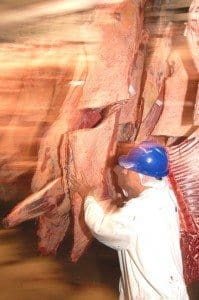RED meat export processing operations could be disrupted as soon as Friday, as Federal meat inspectors and vets aligned with the Community and Public Sector Union take protected industrial action as part of a pay dispute.
Sources suggest the union action is most likely to occur at this stage in the form of overtime bans, which could limit the capacity of daily processing operations at affected plants, rather than stop them altogether. The exception might be extra Saturday shifts under overtime arrangements, which may have to be cancelled, if currently scheduled.
 The union action comes at a difficult time for the export meat processing industry, given that two of the last five weeks have seen record seven-day slaughter throughput across Eastern Australia, driven by drought pressures.
The union action comes at a difficult time for the export meat processing industry, given that two of the last five weeks have seen record seven-day slaughter throughput across Eastern Australia, driven by drought pressures.
Last month Department of Agriculture employees, including meat inspectors and vets, voted to join workers from other Federal agencies threatening industrial action over a wages claim.
The majority of Federal meat inspectors are understood to be union members, and at least some vets. While only union members can take protected action, some may elect not to, Beef Central has been told.
The Department of Agriculture has been negotiating a new Enterprise Agreement with the CPSU, offering an annual 0.5pc pay rise as part of the negotiation, while the union is understood to be seeking 4pc.
In March the CPSU obtained a Fair Work Commission authorisation to conduct a ballot of its members to conduct Protected Industrial Action as part of the EA negotiation process. Ninety-five percent voted in favour of various work stoppages.
The CPSU was obliged to notify DA of the types of bans that it intends to apply, and is required to give DA between five and ten days clear notice before bringing-on any action.
That advice was apparently given early this week, suggesting the first round of overtime bans will be imposed this Friday and Saturday, May 1 and 2. Other potential actions could have included work bans (not supervising meat inspection); data entry bans on tasks like condemnations; or work stoppages from 1-24 hours.
It is understood the protected action has been in place in New South Wales for the past three weeks, but the action has now been taken nationally. Beef Central understands that the actions in NSW, to this point at least, have had only minimal impact on processing operations in that state.
A processing sector contact said the overtime limitation had the potential to seriously disrupt export beef production across Australia, especially if the union’s industrial action continues for any length of time.
The rider on that, however, is that there is no way to gauge at this point how widespread the actions may be.
The union is not obliged to tell individual plants which sites have been chosen for the action, until the morning that it is due to take place. The action in fact may be selective – imposed on just a handful of selected sites – or across the entire industry.
It is also up to individual members in each plant whether they carry-out the action or not, and meat inspector/vet working hours vary from plant to plant. Some plants routinely kill into overtime, while other rarely operate beyond the standard 7.5 or 8 hour shift.
Typically, a government vet carries out ante-mortem duties using a little overtime before the daily kill starts, and in some cases may accrue additional overtime at the end of the day.
That’s because in a typical single-shift plant, a carcase takes 45 minutes from point of slaughter to the point of inspection, so a kill chain operating for 7.5 hours may in fact go into overtime, by the time the last body is inspected.
What this effectively means is that an affected plant under the protected action may have to ‘stop its chain’ earlier than it otherwise would, in order to avoid the inspector/vet ‘overtime risk’ at the end of the shift. The other potential impact is that affected plants that were planning a Saturday ‘overtime kill’ shift this weekend may have to cancel. At last one large export shed is known to have scheduled such a shift this weekend.
The previous CPSU agreement negotiations in 2011 produced only limited disruptions to processing through industrial action (‘nuisance value’ is how one processor contact described it), but there is no guarantee that the current episode will follow the same course. The union must give 3-7 days clear notice if it intends to activate further actions, beyond those planned for Friday and Saturday.
It could be argued that such action this year could have much greater impact than it did back in 2011, given the pressure export processors in Queensland and NSW are currently under to find kill space for drought-affected cattle.
Widespread rain, if it eventuates in coming days as forecast, may help curb the impact, however.
Should the current dispute conclude in a substantial rise for CPSU members, being a fee-for-service arrangement with processors, it is inevitable that meat inspection fees charged to processors would rise. History suggests that those costs would in turn be passed-on to producers, factored-in to livestock purchase cost.
